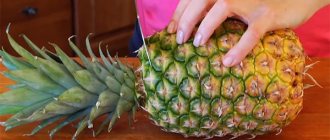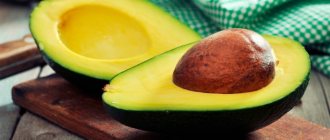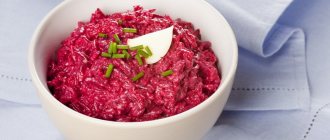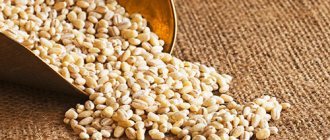Nine months of pregnancy, which for some women fly by almost unnoticed and painlessly, but for others are filled with discomfort, toxicosis, heartburn and constant runs to the bathroom, are behind us. No matter how difficult and uncomfortable it was, it was a happy time. The first realization that a new life has arisen. The first tremors from within small arms or legs. The first ultrasound image, in which curious parents try to see who they are having - a boy or a girl. And so on, you can’t list everything.
Several days in the maternity hospital under the supervision of attentive doctors and midwives. The long-awaited cry of a baby and the happy tears of a mother who has just been placed in the arms of a newborn. Welcoming relatives, an awkward young dad, smiling stupidly and bursting with joy. And now, finally, the baby is home. He snores peacefully in his new crib.
A young mother, who has been denying herself most of her favorite delicacies for nine months, looks greedily at the kitchen, naively believing that now everything is possible. However, an experienced grandmother or a visiting doctor begins to repeat that much is still not possible. Everything that the mother eats will be passed on to the newborn through the milk, and some foods, no matter how healthy they may be, can have a very undesirable effect on the baby. But vitamins and microelements are simply necessary for both a nursing mother and a newborn baby.
How is pomegranate juice beneficial for a nursing mother?
- the amount of antioxidants in pomegranate is higher than in green tea;
- vitamin PP helps restore sleep;
- freshly squeezed pomegranate juice awakens appetite and improves digestion;
- retinol, phosphorus, calcium help cleanse the skin and improve overall condition;
- has a beneficial effect on the nervous system, strengthens the walls of blood vessels, increases hemoglobin;
vitamins B6, E, potassium, magnesium have a preventive effect on heart disease and normalize blood circulation and the functioning of the nervous system, which is so important for the baby;- doctors recommend pomegranate juice for girls with anemia; its diuretic effect removes excess fluid from the body, lowering blood pressure;
- is a prophylactic for coughs and sore throats, providing an antiseptic effect;
- One pomegranate fruit contains 40% of the daily value of vitamin C;
- alkaloids contained in pomegranate bark have an anthelmintic effect.
Interesting! The value of pomegranate juice exceeds that of pineapple, apple, and orange. A huge amount of vitamins, minerals and nutrients that improve the functioning of the body.
It should be noted that this drink is very rich in amino acids (both essential and non-essential) necessary for the full development of the nervous system, water-soluble polyphenols - powerful natural antioxidants, sugars and vitamins.
Many people love this strange fruit, but not everyone knows about its amazing composition. Pomegranate is a storehouse of vitamins, useful micro- and macroelements.
So, let's look at the composition of pomegranate:
- It contains a huge amount of potassium (up to 21% of the daily value for humans). As you know, potassium supports the functioning of the cardiovascular and nervous systems.
- The fruit contains slightly less vitamin C.
- Due to the large amount of iron in its composition, pomegranate is almost as good as red meat.
- It also contains B vitamins.
- Other elements include calcium, silicon, iron and iodine.
- The largest amount of amino acids of all fruits is found in pomegranate.
Beneficial properties of the fruit:
- Thanks to the large amount of potassium, red fruit improves the functioning of the cardiovascular and nervous systems.
- Pomegranate juice has a beneficial effect on digestion and intestinal motility.
- If a woman drinks pomegranate juice while breastfeeding after childbirth, this will help raise the level of hemoglobin in the blood and improve overall health.
- Antioxidants in pomegranate juice help the body fight cancer.
- The functioning of the endocrine system is normalized.
- Brain activity improves.
The list can be continued for a long time - how many benefits this wonderful fruit brings.
The benefits of pomegranate juice and pomegranate during breastfeeding are explained by its unique chemical composition: essential amino acids, B vitamins, ascorbic acid, iodine, iron, potassium, silicon - these are just some of the components that a nursing woman especially needs.
Pomegranate and its juice will help cope with the following conditions common after pregnancy:
- Iron-deficiency anemia;
- nervous and physical exhaustion;
- hypertension;
- sleep disorders;
- weakened immune system;
- avitaminosis;
- malfunctions of the digestive system.
It is recommended to include this fruit in the menu during pregnancy, especially with severe toxicosis.
Pomegranate contains:
- Amino acids, the main task of which is the synthesis of proteins necessary for the functioning of the body. To form a strong skeletal system, regenerate joint tissue and immunity, the body should not experience a lack of amino acids.
- Cellulose. By consuming one hundred grams of fruit, a person will receive 16% of the required fiber per day. It helps improve digestion and efficient bowel function.
- Microelements. The fruit contains a wide variety of minerals: selenium, iron, calcium. Thanks to these substances, the formation of blood elements, the formation of bone and skin tissue occurs. When eating fruit, the newborn’s body will receive potassium, sodium and magnesium, which improve the functioning of the heart and blood vessels.
- Vitamins A, B, PP, E and C. The fruits are distinguished by a high content of vitamin C, which is easily absorbed by the body. It helps improve immunity, which usually decreases during pregnancy and the postpartum period.
During lactation, you are allowed to eat fresh fruit, as well as drink pomegranate juice. Eating this product will diversify your menu and help protect your body from colds.
In the event that increased tooth sensitivity occurs when eating pomegranate, you can include juice in your diet. Is pomegranate juice allowed for a nursing mother? If used correctly, you can enter it into your menu:
- The most beneficial properties are found in freshly squeezed juice, which you can easily prepare yourself. It is not advisable to buy pomegranate juice in the store, as it is made from concentrate and the drink loses all its beneficial qualities. In addition, the composition includes sugar syrup, which indicates a high calorie content.
- When breastfeeding, juice must be introduced into the diet, like any new product, gradually. To begin with, drink 2-3 sips and monitor the baby’s reaction throughout the day. If the baby tolerates it well, you can increase the dose.
- Do not consume more than 30 ml per day, as pomegranate juice has a higher concentration of active substances than fresh fruit.
- Dilute the juice with water. Due to the huge acid content, natural grant juice has a pronounced taste. It is recommended to add water in a 1:1 ratio, this will reduce the effect of acids on tooth enamel and the gastric mucosa, and the taste will acquire a pleasant shade.
When making pomegranate juice, it is not advisable to use metal utensils. As with all citrus juices, the best option would be a plastic juicer, which will help preserve all the beneficial substances without allowing them to oxidize.
Divide the fruit into two parts and pass through a juicer. If the fruit has a thin skin, try mashing it directly into the peel, and then make a hole and pour the contents through it into a glass.
Most vitamins are contained in freshly squeezed juice, so it is better to prepare it at once
Several Possible Side Effects of Pomegranate Juice
Possible Side Effects of Pomegranate Juice
Firstly, pomegranate is a rather exotic fruit, and all pediatricians loudly claim that a young mother feeding her newborn with breast milk is better off eating foods native to the area in which she lives. The body has been accustomed and adapted to them since childhood, and any troubles and disorders are possible only if the products are of poor quality. Secondly, pomegranate, like any brightly colored fruit, especially red, is considered too allergenic to ignore.
From this we can conclude that you can start drinking pomegranate juice while breastfeeding after the baby reaches three months of age. And then, do it carefully, in small portions.
Is it possible to pomegranate during lactation?
Pediatricians advise consuming pomegranate while breastfeeding, following certain rules. Well-known therapist Olga Lukyanova states that nursing mothers should eat pomegranates, apples, plums, and pears, since these fruits are not dangerous during lactation (more details in the article: can a nursing mother eat pears during breastfeeding?).
According to the advice of experts, pomegranate should be introduced into the diet of a nursing mother, observing the following rules:
- Wait until your baby is 3 months old. The best time to introduce fruit into the diet is from 3-5 months after the baby is born. Avoid eating pomegranate in the first month of a newborn's life, as the fruit can cause constipation or colic.
- Follow the recommended dose. During the day you are allowed to eat no more than 50 grams. You can cut the fruit into four equal parts and enjoy one of them every day. By following this rule, you will not harm either yourself or the baby.
- Start eating pomegranate with caution and take your time. For the first time, eat just a little bit, up to 10 grains of the fruit, then monitor the child’s reaction: whether there is an allergy, constipation or colic. If there is no reaction to eating the fruit, you can increase the serving quantity by another 10 grains. Over time, you will be able to eat the permitted amount per day.
- Pay attention to your body's reaction. If you experience constipation, heartburn or increased tooth sensitivity, it is better to avoid eating this exotic fruit.
Table of vitamins and minerals contained in pomegranate juice
| Vitamins, minerals | Effect on the body | Contents in product/100 g |
| Vit. A | Restoration of skin, hair, vision. | 5 mcg |
| Vit. IN 1 | Restores metabolism, increases concentration, stimulates the brain. | 0.4 mg |
| Vit. AT 2 | Relieves fatigue, improves vision, increases skin elasticity. | 0.01 mg |
| Vit. AT 5 | Energizes, slows down aging, cures dermatitis. | 0.5 mg |
| Vit. AT 6 | Activates brain function, improves skin, normalizes nerve cell activity | 0.5 mg |
| Vit. AT 9 | Balances the emotional state, improves immunity. | 18 mcg |
| Vit. WITH | Strengthens the immune system, reduces stress, improves mood, appetite, and gives strength. | 4 mg |
| Vit. E | Regulates hormonal levels, improves blood, strengthens blood vessels, increases tone. | 0.4 mg |
| Vit. RR | Improves memory, strengthens the heart, relieves stress, helps with insomnia, restores sleep, normalizes blood circulation. | 0.5 mg |
| Calcium | Strengthens nails and bones, lowers blood pressure, normalizes blood clotting. | 10 mg |
| Potassium | Regulates water balance, normalizes heart rhythm, improves brain function, and improves muscle function. | 150 mg |
| Sodium | Prevents cramps, spasms, normalizes heart function, and is good for teeth. | 2 mg |
| Magnesium | Strengthens blood vessels, reduces women's pain and headaches, relieves cramps. | 2 mg |
| Iron | Delivers oxygen to tissues, increases tone, helps cell growth. | 1 mg |
| Phosphorus | Strengthens teeth and bones, helps kidney function, improves memory, and increases brain activity. | 8 mg |
Pomegranate juice will bring many benefits to a nursing mother and her baby.
Subject to the necessary conditions of choice and rules of use, this product can provide invaluable assistance to the body. In addition, this fruit is simply ideal for strengthening the immune system. Every mother should know whether pomegranate can be used while breastfeeding, because breastfeeding is the most natural thing in the world for a baby. Pomegranates will help a nursing mother not only increase hemoglobin, but also make the overall composition of milk more saturated with vitamins and microelements.
There are up to 410 varieties of this most useful fruit, ranging from wild and indoor varieties to elite varieties - the sweetest and thinnest.
A tree grown at home blooms beautifully, pleasing the eye and uplifting the mood, which is important to avoid, however, alas, homemade fruits are often tart and more bitter
However, in our article about whether pomegranate can be breastfed, we will talk about cultivated varieties, the composition of which is approximately the same. The fruit is not only tasty, but also extremely beneficial for the body with its amazing composition. Below we will describe in more detail exactly how pomegranate can be beneficial for the body.
If, while pregnant, you calmly and often ate these fruits, then the baby will be familiar with this taste through the amniotic fluid and the introduction of pomegranate into the diet of a nursing mother will go smoothly. It’s another matter if you didn’t use pomegranate while you were pregnant, or if you did, but extremely rarely. Here, during the first month, therapists advise holding off on introducing pomegranate into food, because the fruit and its juice contain a red pigment, which is extremely rare, but can cause food allergies in the baby. From the second month, it is not only possible, but also necessary to eat pomegranates little by little.
Introduction of pomegranate into the diet of a nursing mother
I would like to draw your attention to the fact that any new product should be introduced into your menu not only gradually, but also best in combination with another dish (where the new component acts as an addition). Early in the morning, try adding 5-10 grains to kefir with
You can introduce grains into your diet closer to lunch, as shown in the photo below - by adding some grains to a dish of spinach and chicken. In eastern countries it is even added to pilaf.
Of course, you shouldn’t introduce two new products on the same day. If your baby develops a rash or colic from accumulated gases, you won’t know which product to think about. Therapists recommend starting pomegranate administration with 30 grams. natural but diluted juice. Take 17 grains, put them in a transparent tall glass, press (the walls of the glass will prevent the juice from splashing) with clean fingers, and add 2 tablespoons of water. That's it, the health elixir is ready!
It is strictly not recommended to buy store-bought juices and nectars. Pomegranate juice is one of the most popular, and therefore the most counterfeited. Preservatives, dyes, and it’s good if natural beet juice is added to the tetra pack for color, and not a chemical dye.
In what cases is it better to stop eating pomegranate?
Despite the huge amount of vitamins and nutrients, not everyone can eat it.
Let's look at what this might be connected with:
- If you have a stomach ulcer or high acidity, it is not recommended to take pomegranate juice due to the large amount of fruit acids in its composition.
- Freshly squeezed pomegranate juice has a detrimental effect on tooth enamel - this is especially true for pregnant and lactating women.
- The fruit is an allergy-causing product. Therefore, during breastfeeding, pomegranate should be introduced into the diet gradually and with caution.
- Toxic substances in the peel, if consumed in large quantities, can cause severe poisoning.
- Excessive consumption of juice or fruits due to tannins in the composition can cause constipation.
Benefit
Pomegranate contains antioxidants and vitamins, as well as amino acids necessary for the normal functioning of the nervous system. The set of vitamins of this miracle berry contains the largest amount of vitamin C and group B. It also contains a lot of vitamins A, E, and PP.
All these elements are necessary for normal metabolism, attachment and growth of bone tissue, new cells, functioning of mucous membranes, organ regeneration, blood clotting, and more.
Can a nursing mother drink this fresh juice? She and her child simply need this fruit, rich in microelements, since the berry contains many vital substances that the body is not able to synthesize on its own.
For example, vitamin C is not produced by itself, but with the help of this element the body absorbs iron and synthesizes hemoglobin, strengthening the immune system, bone and connective tissue. If there is a deficiency, the mother may experience brittle fingernails and toenails, hair loss, pale face, fatigue, and oral ulcers.
Let's consider other elements that are absorbed thanks to this fruit, or contained in it:
- Magnesium is essential for the functioning of the nervous system.
- Potassium is the basis for the functioning of the cardiovascular system and brain. By the way, pomegranate contains more potassium than any other fruit. Even more than a banana.
- Iron is the main element for blood formation.
- Sodium regulates the water-salt balance, therefore it is extremely important for genitourinary function. Necessary for neuromuscular activity, nervous response to stimuli.
- Folic acid (vitamin B9) is required for the formation of central nervous system cells, red blood cells and system regeneration. Therefore, the attending physician can prescribe it directly during pregnancy.
Read also: Is it possible to eat sour cream while breastfeeding: homemade, with cottage cheese, purchased
? The fruit contains 15 amino acids, which can only be found in meat. This is a big plus of the fruit for people who choose vegetarianism. The pulp of the fruit contains special astringents that can help with colitis and diarrhea. In addition to its benefits, pomegranate helps to recover from hormonal disruptions in the body, which so often happen after the birth of a baby.
If you are still in doubt, is it possible for a woman who has resolved to drink pomegranate juice? Then here is a list of functions performed by this berry:
- Strengthening the immune system.
- Skin regeneration.
- Restoring hair health.
- Preservation of visual acuity.
- Tissue regeneration.
- Solving the problem of diarrhea.
- Relief of cramping pain during menstruation.
- Normalization of metabolism.
- Stabilization of hormone levels in the blood.
- Strengthening the cardiovascular system.
- Decreased blood pressure.
- Slowing down the aging process.
Rules for using pomegranate for breastfeeding
To get the maximum benefit from pomegranate and avoid unpleasant reactions, a woman during breastfeeding must adhere to a number of rules when consuming this product. It is important to pay attention to your well-being and that of your baby.
Experts give the following recommendations:
- Start eating pomegranate with small portions. If within two days the woman and her baby do not experience any negative symptoms, then you can continue to eat the fruit in moderation;
- include the fetus in the diet no earlier than three months after the birth of the child;
- after consuming the product, rinse your mouth thoroughly with water and soda to neutralize the aggressive effect of fruit acids;
- if allergic reactions, bloating, or indigestion occur, you should immediately exclude the exotic fruit from your diet;
- The squeezed juice cannot be drunk in its pure form; it must be diluted with water.
If a nursing mother wants to try an exotic fruit, she first needs to choose it correctly. When choosing a fruit, certain rules should be followed:
- Pay attention to the pomegranate peel. Ideally, it has a bright dark shade. Make sure it is level and without any damage. The presence of spots on a pomegranate indicates that the fruit is too ripe, or even rotten.
- Place a pomegranate on your palm. For comparison, take several fruits - the heaviest one will be riper than the rest.
- Try tapping the fruit. A ripe fruit has a metallic sound.
- Check the place where the fruit flower (“crown”) was located. It should be dry, not green.
Ideally, you should drink freshly squeezed juice. However, if you had to purchase a product in a store, follow these rules when choosing it:
- It is better to give preference to pomegranate juice in glass bottles.
- The bottle cap must have special protection. To open the bottle you will need to cut the protection with a knife.
- Check the label. Everything should be clearly visible on it: composition, vitamins, date of manufacture and shelf life.
- High-quality pomegranate juice should be dark burgundy in color.
- Please note the production date. Typically, fruits ripen between September and November.
The main principles of using pomegranate while breastfeeding are as follows:
- gradually increasing the amount in small doses;
- moderation;
- monitoring reactions in mother and child.
It has long been noted that if any reaction to a product occurs in a nursing mother, it is likely to occur in a baby.
How to introduce fruit into your mother's diet
Firstly, you need to remember that in the first month of a child’s life you need to adhere to a strict diet. There is no question of introducing new foods into your daily diet! And this applies not only to pomegranate, but also to all other red foods. It is best to start introducing pomegranate into your menu after your child reaches four months of age.
Secondly, the best time to introduce pomegranate is autumn/winter. These times of year are the most optimal, because the product appears on the shelves of all stores.
And, of course, you need to choose pomegranate wisely. It must be mature and intact. Spoiled fruits and vegetables are contraindicated for nursing women!
Pomegranate seeds
The granular pulp contains fiber. This will help prevent your baby from becoming constipated. The first portion is no more than 10 grains as an additional ingredient. For example, you can add 7-10 pomegranate seeds to yogurt or vegetable salad.
Pomegranate juice
Pomegranate juice is absorbed by the body quickly and helps increase milk supply. You need to drink it, starting with 30 ml (2 tablespoons) of diluted juice per day. In the absence of allergies, the portion can be increased to 1 cup (150-200 ml) per day.
Pomegranate peel
The desire to eat crusts while breastfeeding may be due to some problem, for example, diarrhea in the baby or in the mother. In this case, you can make a weak tea from the peels, or simply pour half a teaspoon of pomegranate powder with water.
The mother herself decides whether or not to introduce any product; what is harmful for someone is useful for others. But for the first three months of the baby’s life, the mother must follow a strict diet, allowing the baby’s stomach to adapt to new food and learn to digest it independently.
Red fruits and vegetables can cause allergies in a baby and it is worth delaying their consumption until five months. According to the recommendations of pediatricians, a nursing mother can try pomegranate after six months, but not more than a quarter of the fruit.
As for pomegranate juice, a couple of sips diluted 50/50 with water are allowed. Observe the child's condition for 2-3 weeks. It is also necessary to remember that local seasonal products are much healthier than imported goodies.
Can it cause harm? Are there any restrictions? Contraindications. Pomegranate contains tonin, which can cause constipation and bloating. Fruit acids, which pomegranate is rich in, can worsen the condition of tooth enamel.
Therefore, you need to eat the fruit carefully, monitoring the reaction of the baby’s and mother’s bodies. For women with stomach ulcers and increased acidity of gastric juice, it is better to avoid the product altogether. Decoctions of pomegranate bark contain toxic substances that, in case of overdose, increase blood pressure, cause dizziness, and convulsions.
Should I consult a doctor? Consultation with a doctor when introducing a new product is advisable.
In any case, a few grains of ripe, juicy fruit won't hurt. Observe how the baby is feeling, if there is no rash, constipation, bloating or allergic redness, then eat to your health. Is it possible for nursing mothers to eat every day? According to doctors, a large amount of pomegranate can spoil the taste of milk (introduce sourness), so eating pomegranates every day is not recommended. In addition, an allergy to this product does not appear immediately; pomegranate is one of the cumulative allergens. One small guarantee a week will benefit both mother and newborn baby. Is it with or without seeds? Bones contain many healthy components. When consuming grains with seeds, blood pressure is stabilized and headaches are reduced, pain during PMS is reduced, but the seeds must be chewed very carefully. Pomegranate seeds have strengthening properties and are useful for diarrhea, so it is better to refrain from consuming them if you are constipated.
Is it possible for nursing mothers to buy store-bought pomegranate juice? What should you pay attention to when buying this juice? Breastfeeding women should avoid store-bought preservatives, because you never know what is included. For the first six months after giving birth, it is recommended to consume only natural homemade products, especially since after processing the beneficial properties are reduced by about half. When choosing, you need to take into account several rules: Pay attention to expiration dates. Natural pomegranate juice is sold only in glass bottles with a sealed cap.
The label must clearly indicate the contents of the bottle. Production date: September-November. The juice should be a rich dark burgundy color.
Contraindications
A nursing mother knows that the consumption of exotic fruits while breastfeeding is strictly limited. Such fruits negatively affect the baby’s well-being and often cause an allergic reaction. The only exception is bananas.
In addition, fruits brought from distant exotic countries are chemically treated for long-term storage. Preservatives have a negative impact on the health of both the baby and the mother. They lead to severe poisoning!
However, doctors allow some fruits to be consumed 3-4 months after the birth of the child, when the baby’s body adapts to the new food. Pomegranate and pomegranate juice are among such fruits. However, this fruit and drink can only be consumed by a nursing mother with extreme caution and in compliance with certain rules.
It is very important to monitor the baby’s reaction after introducing pomegranate into the mother’s diet so as not to harm the baby, since the fruit may be allergenic for him. If no changes are noticeable in the child’s behavior, then there is no cause for concern, and you can continue to breastfeed.
If you have an allergy, you may notice the following signs:
- restlessness, crying, colic;
- red spots on the face and body, rash;
- constipation or diarrhea;
- regurgitation, vomiting;
- allergic runny nose.
And nursing mothers should avoid pomegranate if they have individual intolerances, allergies, hypotension, or gastrointestinal diseases.
Before introducing any product into your diet, it is better to consult your pediatrician and follow his instructions.
Since pomegranate has a pronounced biologically active effect, you need to keep in mind that it can cause colic, constipation, diarrhea and allergic reactions in a child. A nursing mother should use this fruit with extreme caution in the following cases:
- tendency to constipation in both the nursing mother and the child;
- predisposition to allergies;
- low blood pressure;
- increased stomach acidity, gastritis.
If relatives have food allergies, it is better for a nursing woman to refrain from eating pomegranate and its juice for the first 5 months after childbirth.
Attention! The fruit acids contained in pomegranate seeds harm tooth enamel, so it is recommended to rinse your mouth with water after eating them. It is better to drink pomegranate juice through a straw.
When breastfeeding, you should not eat pomegranate seeds along with seeds, as they contain estrogens - substances that affect hormonal levels.
How to drink pomegranate juice while breastfeeding
There are several rules and they are practically no different from those that must be followed when introducing other useful, but not very familiar foods into the diet of a nursing mother:
- The first attempt to drink pomegranate juice can be made when the child reaches three months of age. Doing this earlier means exposing the newborn to the risk of not only allergies or diathesis, but also disrupting the functioning of the digestive system and intestinal tract, which has not yet fully activated, which can lead to bowel dysfunction, colic and other painful troubles.
- Pure, concentrated or freshly squeezed juice is definitely excluded. It is necessary to dilute it with boiled water in a 1:1 ratio.
- The first portion should not exceed just a few drops.
- Closely monitor the baby's standing. Has the chair changed? Have any rashes or redness appeared on the skin? If a baby begins to cry for no reason and pulls its legs towards its stomach, this is a sign that the small and not yet perfect stomach has reacted painfully to a new stimulus.
- If you notice at least one of these unpleasant signs, you should immediately, without further experimentation, exclude pomegranate juice from your diet for at least another month.
Agree, all this is not difficult. The main thing is that the first place should not be the desires and whims of the young mother, but the health and general condition of the newborn. Mom endured it for almost a year, she can wait a little longer, but the baby should not be exposed to even the slightest danger.
Is it possible to eat this fruit during breastfeeding, including in the first month?
Many people know that pomegranate juice helps increase hemoglobin concentration. If pregnancy and delivery are difficult and the woman has lost a lot of blood, she may develop anemia. This condition is bad for health.
Therefore, nursing women with anemia have a question about whether pomegranate will harm her and the baby, since the child’s health directly depends on what the mother eats. Therefore, before including pomegranate in your diet, it is necessary to consider the characteristics of this fruit.
Pomegranate contains the following substances:
- amino acids;
- cellulose;
- microelements;
- vitamins;
- tannins;
- fruit acids.
Why is it dangerous?
Pay attention to the bright red color of the fruit, indicating that this is a powerful allergen.
The appearance of a rash, redness, peeling of the skin, itching, runny nose or cough in you or your baby indicates an allergic reaction to the irritant. In this case, stop eating such food without any hesitation.
As already mentioned, the acids contained in the berry can corrode the walls of the digestive tract. In addition, eating pomegranate in large quantities can cause bloating, pain, and colic in a baby. Remember, if you have stomach ailments, you should not eat the fruit.
Women with low blood pressure should use it especially carefully, carefully monitoring their sensations. By the way, carefully peel the peel from the fruit, since it contains alkaloids, in other words, poison that poisons your body.
Read also: Can a nursing mother eat black bread (with breastfeeding)?











